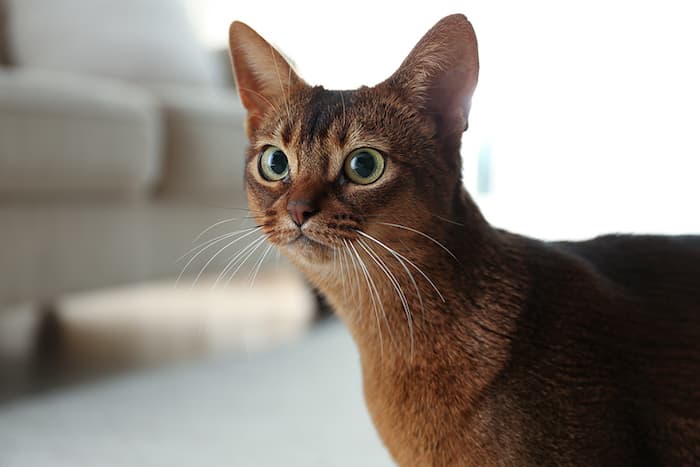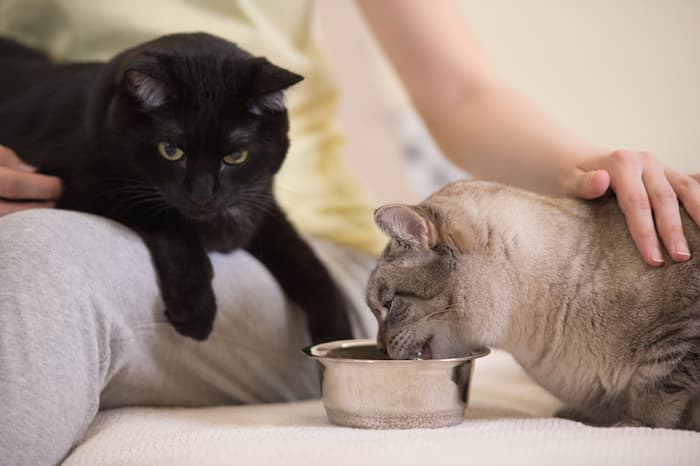Oh no, your poor cat’s dealing with diarrhea again, and it’s looking worse than the usual messy situation. We all know how gross and smelly that can get, not to mention the stench in your home. But even more crucial is that frequent diarrhea can seriously mess with your cat’s well-being. If your furry friend has diarrhea multiple times a day for over a few days, it’s time to take action.

Understanding Cat Diarrhea: Causes and Symptoms
Numerous problems, including infections and food sensitivities, can result in diarrhea in cats. The symptoms are usually obvious — those loose, watery stools, sometimes with a stink, can knock you off your feet. If your cat’s got the runs, it’s crucial to figure out what’s causing it so you can get them feeling better instantly.
Common culprits include parasites like giardia or worms, especially in kittens. Bacterial infections can also lead to this mess, and sometimes, it’s because your cat decided to go dumpster diving again. Cat diarrhea Food allergies or intolerances could also be the reason, especially if your cat frequently leaves you surprises in the litter box.
Chronic diarrhea can lead to dehydration, so make sure your cat always has fresh water available. Consider switching to a gentle, easy-to-digest diet like boiled chicken and rice to give their belly a break. Probiotics can work wonders to restore balance in their gut.
If the diarrhea continues over a few days, gets bloody or foul-smelling, or your cat seems off their game, it’s time to haul them to the vet. They can run tests on that stool, check for parasites and infections, and do bloodwork. Once they figure out the problem, they can prescribe deworming meds antibiotics, or recommend a change in diet to get your cat’s business back to normal.
The Effects of Chronic Diarrhea on Your Cat’s Health
Chronic diarrhea is no joke; it can affect your cat’s health and happiness. Those frequent bathroom incidents aren’t just a hassle for you; they drain essential nutrients and fluids from your furry buddy.
Dehydration and electrolyte imbalance: When cats make a watery deposit, they lose fluids and minerals like sodium and potassium. It could cause some severe issues if you pay attention to it. Make sure your cat always has access to fresh water, and consider asking your vet about electrolyte supplements or fluids to get things back in balance.
Weight loss: All that frequent bathroom action can mess up your cat’s nutrient absorption, leading to weight loss over time. Your vet might recommend small, regular meals of a special high-calorie diet to keep your cat at a healthy weight.
Irritation and discomfort: Diarrhea can irritate your cat’s colon and behind, leaving them feeling crummy and uncomfortable. Your vet can suggest some meds or supplements to help soothe the irritation and make your cat more comfortable going through this messy business.
Remember, while diarrhea might improve in a few days, chronic or severe cases need a vet’s attention to determine and treat the root cause. Call your vet if your cat shows signs of dehydration or the diarrhea sticks around for over a few days. With the proper treatment and some TLC at home, your cat can return to feeling good and enjoying life without those messy mishaps.

Managing Cat Diarrhea: Treatment Options for Relief
When your cat’s got the runs, you’ll want to do what you can at home to help them feel better and keep them from dehydrating. Here are a few things to try before calling the vet:
- Switch to a bland diet: Give your cat some boiled chicken, rice, and pumpkin. It gives their tummy a break from rich, fatty foods, and the fiber in pumpkin helps solidify those loose stools. Feed them small amounts several times a day until things start looking more solid in the litter box.
- Up their fluid intake: Ensure your cat drinks enough to avoid dehydration. You can offer low-sodium chicken broth or water from canned pumpkin in addition to their regular water. Keep a close eye on them because cat dehydration can get severe quickly. If they’re lethargic or their gums are dry, it’s time to contact the vet.
- Probiotics: These can help get your cat’s gut bacteria back in balance. Look for pet probiotic supplements with strains like Enterococcus faecium. Follow the dosing instructions and give them food.
For terrible diarrhea or if it sticks around for more than a few days, it’s time to bring in the big guns: your vet. They might prescribe anti-diarrheal meds or antibiotics if there’s an infection. If things get super serious, they can provide IV fluids. Occasionally, food allergies or parasites may be the underlying cause, necessitating diagnostic procedures such as ultrasounds, blood tests, and fecal examinations. The key is to keep close contact with your vet, follow their at-home treatment plan, and get your cat checked out immediately if things aren’t improving or are getting worse.
Conclusion
So, in a nutshell, cat diarrhea isn’t a laughing matter, and you should take it seriously. If you don’t take care of it, dehydration and other health issues may develop fast. Pay close attention to your cat’s symptoms and bathroom habits, and don’t hesitate to visit the vet if things don’t improve or seem serious. The tests and treatments might take time and money, but your cat’s health and happiness are worth every bit. Please do your part to return them to their usual playful and cuddly selves. With the proper care, cat diarrhea will become a thing of the past, and your feline friend will handle the litter box like a champ. Stay positive – you’ve got this!
